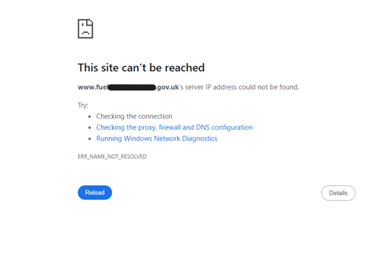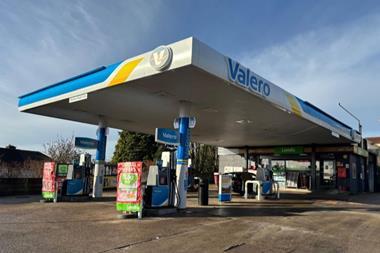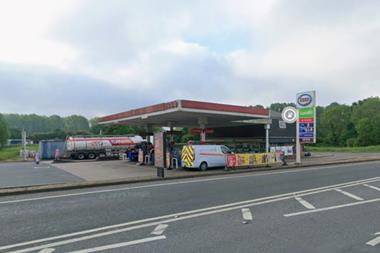Failing to look after your tanks and pipework properly could really land you in hot water. Not only can a fuel leak seriously damage and pollute the environment, it could end with a hefty fine. But while leaks are something forecourt operators are well aware of, experts are warning retailers to prepare for another problem - jellyfish. No, not the real variety, but something that resembles these sea creatures - and which could end up growing in your fuel tank. And it’s all to do with the growing use of biofuels.
Tank cleaning specialist David Plumb & Co is one company which has come across this phenomenon in tanks in the UK which have been used to store biofuel, and its director John Moore says it is something retailers cannot afford to take lightly.
"If you are thinking of using biodiesel or biodiesel blends in your forecourt bunkering or company tanks, it is vital to ensure they are clean before you do so, unless you want clogged pipes and strange jellyfish-like objects floating in your fuel," he says.
Companies operating in this area are reporting a surge in problems with blocked filters and organisms growing inside tanks due to the use of biodiesel. And they are warning retailers to take every precaution to protect fuel from contamination, including keeping tanks as clean as possible before any type of biofuel is put into them. The issue seems to be a very sensitive one because of the big companies which have needed their tanks cleaning after they have become clogged or contaminated by organisms. There are issues surrounding who is responsible for such contamination and the subsequent cost of cleaning.
And many feel this is just the tip of the iceberg. Moore explains: "Normal diesel is a fairly robust fuel and while rust particles and sludge can eventually cause clogged pipes, it is important to get your tanks cleaned thoroughly every 10 years or so. On the whole it will tolerate a degree of contamination and moisture without giving problems.
"Biofuels are different - because they are made from vegetable and cereal crops they can supply sustenance to any bacteria that are present in the tank. If there is any water present, and most tanks will have at least some water in them, under the right conditions, there are up to eight types of bacteria that can flourish in biodiesel. In a short time, millions of live and dead bacteria can form clouds and gelatinous masses within the fuel, which clog up pipes, dispensers and even engines. Water is a particular problem when it becomes involved with biofuels. While it will settle to the bottom under petrol or diesel, it mixes with ethanol and biodiesel causing phase separation.
"If a problem occurs, the only practical way to deal with it is to drain the tank, safely dispose of the fuel and then clean the tank. This means that, on top of the cost of cleaning, a whole tank full of fuel has been wasted." Moore adds that the best way to avoid the problem in the first place is to get tanks thoroughly cleaned before introducing biofuels.
David Plumb has two main sides to its business: fuel site decommissioning and tank cleaning. Over the past few years, Moore says the balance has shifted from tank cleaning to decommissioning, as forecourt operators have closed down sites and preferred to remove tanks when they redevelop or have a sludge problem. But often when the company is removing them it finds it is dealing with perfectly serviceable tanks that it could have cleaned safely and efficiently for re-use.
With the growth of biodiesel however, Moore says it expects to see the balance tipping the other way, as more and more operators realise the "devastating consequences" of putting biodiesel into tanks that have not been thoroughly cleaned first.
Other companies are also warning of trouble ahead. Alan Stewart, managing director of Cyrus Energy, says: "The recent addition of biofuel in the fuel mix means we’ve seen a dramatic upsurge in the number of people coming to us with problems with blocked filters," he says. "There can be all sorts of problems and they have nothing to do with how old the tanks are. The equipment can be brand new and they’ll still experience the same blockage problems.
"We’ve been working over the past year to improve the ways we remove microbial contamination from fuel - in other words, the bugs that lie in the fuel and cause the filter blockages.
"I think the problem regarding biofuels will definitely get worse."
The government is really pushing the biofuels issue, and next year it is due to introduce measures to ensure that every litre of fuel sold on the forecourt contains a certain percentage of biofuel. The Renewable Transport Fuels Obligation (RTFO) will set an initial amount of 2.5% of biofuel per litre on April 1 2008, which the government aims to raise to 5% by 2010/11.
So what will the increasing use of biofuels mean to retailers’ tank maintenance?
The growing number of reported problems with tanks in the past year means it has been busy at Cyrus, and Stewart puts this down partly to biofuel use on the forecourts. The company offers Eradicate, a fuel biocide which destroys microbial contamination by getting rid of the bugs and bacteria that can attach to the tank or pipe wall. As soon as the Eradicate fluid hits the contamination it kills it off, taking about 24 hours to work. Eradicate should be a one-off treatment and is aimed at diesel tanks at the forecourt as well as fuel tanks on vehicles.
The company has also seen a rise in demand during the past 12 months for its secondary product, Cyrus Fleet. This is a water dispersant which removes water from the storage tanks, and retailers are recommended to use the maintenance product about four times a year. The product can be used in either petrol or diesel tanks.
Stewart says the cost of product is site dependent, with the price decreasing when more product is bought, but he describes the cost for any forecourt operator as "fractional".
"It’s an inexpensive and easy way to keep your tanks in good working order," he says.
Other companies like Liquid Cargo Management (LCM Environmental) have also seen a rise in demand for products to detect contamination in tanks and pipework.
Mark Orr, corporate development director at LCM Environmental, says more retailers are keen to detect problems early. But according to Orr, forecourt operators are also becoming much more risk averse in the management of their tanks.
He says: "All forecourt operators are very aware of the everyday risks of storing fuel, but any concerns over the age of the tank or any other worries and they are keen to take precautionary measures. They know it can be extremely expensive to clean up after a leak and they want to avoid that. Many are keen to either line the tank or replace it altogether rather than risk that."
LCM Environmental has teamed up with Tanknology UK to offer the monitoring device Petroscope. Together they sell and operate this product, a remotely-operated camera that goes into tanks, purged with nitrogen, to carry out high-quality remote inspections. The results are passed to an engineer who gives the findings to the customer while making recommendations for any future maintenance. The Petroscope is still relatively new to the UK, it was used 30 times in 2006 but Orr says this figure doubled in 2007.
Orr adds: "One of the most risky procedures on the forecourt is putting a man in a tank. Nobody wants to do that anymore, not when there is an alternative method like the Petroscope which allows remote tank inspection with a high-res camera. It is then up to the customer to decide what work, if any, needs doing."
In addition, if any sludge is located, this can be removed remotely. That way, if there is any bacteria in the tank, it will not be stored within the fuel. Meanwhile, Orr says retailers are becoming increasingly keen on trying to save money by re-lining or repairing faulty tanks rather than replacing them. "Companies are very concerned about the costs of maintenance on forecourts, after all, they aren’t making a great deal of margin on fuel any more," says Orr. "The cost of replacing the tank is significant both in terms of lost trading and having to pay for replacing the tank. If it is re-lined, the forecourt operator gets another five to 10 years out of the tank. This gives them a degree of security, and they see a good return on investment."
On average, it costs 40ppl to re-line a single skin tank with LCM, and 80ppl for a double skin, and this covers all costs, including cleaning the tanks before the re-lining.
Another company involved with relining is Sunderland-based Abfad, which has worked with Newcastle University to develop an advanced tank lining system which it claims could save the industry millions - as well as tackle the biofuels problem.
Abfad says its double skin tank lining system can prolong the life of tanks by preventing internal decay and corrosion, to the point where tanks could last for the lifetime of a petrol station. It also includes a special layer which is the basis for an early warning system for leaks.
Abfad chief executive, Chris Haritou, says the company has been seeing increasing signs of degradation on fuel tanks through corrosion, largely due to the lead - which used to act as a rust inhibitor - being removed from petrol.
Another company which claims to be ready for the ’greener fuels’ revolution is pipework specialist PetroTechnik. It makes UPP polyethylene pipework, and supplies underground tanks through Cookson & Zinn (CZ). PetroTechnik’s sales and marketing director, Stephen Maley, says: "Customers who have installed UPP pipework can be assured that it is fully approved for all new biofuels and the system will remain the safest method of transporting fuel underground. Many customers have asked about the effect the fuels are likely to have on CZ underground storage tanks. Our view is that the tanks may need cleaning more regularly in the future because of the bacterial deposits associated with biofuels, but apart from that, CZ underground storage tanks are ideal for all biofuels."
Maley says the UPP pipework has also been approved for use with all the new alcohol-based E50-E100 (ethanol and gasoline mixture) fuels and CZ is supplying tanks specially manufactured for Adblue. These are carbon steel, but with an internal liner and stainless steel fittings. He adds this provides a cost-effective alternative to stainless steel or plastic tanks.
Petrotechnik has launched additional products in the UPP range. These include the Entryfusion seal for polyethylene chambers and sumps, which provides a liquid-tight seal for the life of the installation. The company says the benefit of this product is that it replaces several parts with one seal, and, because it welds to both the pipe and the chamber wall, it reduces the risk of leakage.
Meanwhile, the final word of warning on the biofuels issue comes from LCM’s Mark Orr: "We don’t want a repeat of the contaminated fuel which was sold by the supermarkets early in 2007," he says. "After all, the reputation of the forecourt refineries rests on the quality of the fuel they sell."
----
=== top tips for tanks ===
Mark Orr, corporate development director at Liquid Cargo Management, gives the following advice on caring for forecourt tanks:
? If tanks are more than 15 years old, get them inspected at least once every five years.
? Monitor your fuel management system and if you see anything unusual, get it checked immediately. This could be via a remote inspection to minimise the impact on forecourt business - it will mean some financial outlay but at least it will give piece of mind.
? There are several environmental factors which can affect how vulnerable tanks are to corrosion and contamination, such as if they are sited in a high water table area, or if the local area contains chalk. These factors could mean more regular inspections are necessary. Make sure you know if your site is affected by any of these.
? If in doubt, check out the recommendations by the Association of Petroleum and Explosives Administration, for more information log onto [http://www.apea.org.uk].



























No comments yet